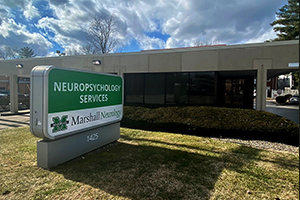Behavioral changes can occur because of neurological trauma, neurodegenerative or other acquired conditions. Our trained neuropsychologists at Marshall Health specialize in the relationship between brain function and behavior, emotion and cognitive functions for both pediatric and adult patients.
Our neuropsychology specialists are embedded in the care teams within the departments of Neurology and Neurosurgery in order to provide patients with comprehensive neuropsychological/neurocognitive testing that may be helpful in diagnosing deficits related to:
Assessing brain function
A neuropsychological evaluation involves assessment using a series of standardized tests that are sensitive to the effects of brain dysfunction. Neuropsychological assessment shows the ways in which a person can or cannot perform certain functions or tasks that are dependent upon brain activity, especially in the context of daily life.
What tests are used?
In addition to comprehensive neuropsychological evaluations, we also offer pre-operative spinal cord stimulator psychological evaluations and pre-operative bariatric psychological evaluations. Tests are typically conducted by paper/pencil or on the computer. They assess the following areas of cognition, or thinking:
An interview and an assessment of emotional functioning are often performed as well.
When should I consider having a neuropsychological evaluation?
Neuropsychological evaluations are conducted for various reasons including: 1) assessing for possible problems with brain functioning, 2) assisting with diagnosis, 3) defining brain-related strengths and weaknesses, 4) guiding treatment for personal, educational, or vocational needs, 5) making relevant recommendations to health care providers and caregivers, and 6) documenting possible changes in cognition over time.
Difficulties that might signal the need for evaluation include:
Testing results
Once you’ve complete the evaluation, a neuropsychologist will review your results. He or she will then generate comprehensive report that summarizes the findings and provides recommendations for treatment. With your permission, the report will be sent to the doctor who referred you for testing. A feedback session with the patient and family may also be arranged.
Clinical Interests:
Locations:
Clinical Interests:
Locations:
Clinical Interests:
Locations:

1425 Hal Greer Boulevard
Huntington, WV 25701
Phone: 304.691.1606
Take the next step toward a healthier mind.
Neuropsychology at Marshall Neurology
304.691.1606